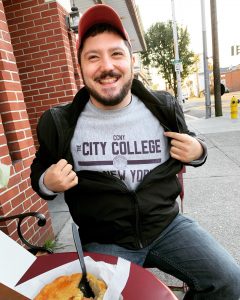Christopher LoBosco Hoffman is an environmental and critical social psychologist specializing in community-based and participatory research. He is the first to complete a dual doctorate in environmental psychology and critical social and personality psychology at the Graduate School and University Center of the City University of New York. Hoffman studies ways to empower communities by equipping them with the resources to produce their own research, and to use their research to influence policy. Chris is specifically interested in participatory action research and the intersections of policy, education, and social justice.
research to influence policy. Chris is specifically interested in participatory action research and the intersections of policy, education, and social justice.
His dissertation “Tongues out of Place: Narratives of Hereness and Images of Be(long)ing” explores the role of the psychologist during times of gentrification, climate change, and inequity. Using Hall & Massey’s (2010) term conjunctural crisis, or the overlapping of multiple disasters that bleed into each other, Hoffman argues that psychologists have a responsibility to combat social inequity and work towards tangible strategies in collaboration with communities to dismantle structures of oppression. In times of gentrification and climate change, Hoffman argues that psychologists must play a role in promoting public science, a praxis of research committed to applying social science with communities in order to work towards social justice and build a more just world (Stoudt et al 2019). In conversation with examples from his own experiences in two sites of research, teaching, and community work, Hoffman reflects on the lived tensions that psychologists must navigate and mediate with communities to combat hermeneutical injustice (Fricker 2004). Across each of these two sites, Hoffman applies pedagogical workshops, visual analysis, and discourse analysis with communities to combat erasure by collectively analyzing our own narratives and images of being and belonging. Through meditations on notions of hereness/thereness, Hoffman presents and contextualizes critical obstacles facing the psychologist’s role in public science. To further aid the psychologist, Hoffman outlines an epistemology of hereness, an epistemological stance that helps situate the psychologist within historical contexts, intersections of power and oppression, and local communities. By locating the psychologist within the contexts, intersections and communities of “here,” Hoffman provides one strategy to work with communities in times of crisis in (re)defining the role of the psychologist, creating narratives and images of be(long)ing, and (re)imagining a more equitable world.
Chris has taught Statistics, Psychology of People and Place: From Climate Change to Gentrification, and Queer(ing) Psychology as a Teaching Fellow at CCNY and International Perspectives on Psychology, Communities in Context, and Doing Research with Young People: Research, Policy, and Activism as Guest Faculty at Sarah Lawrence College. Chris is a co-founder of TESANDA, a transnational network of critical solidarities. Chris continues to teach English conversation skills with the Yonkers Sanctuary Movement and volunteers with environmental education at the Flat Rock Brook Nature Center and LGBTQIA+ elder outreach with SAGE USA. Chris is a former Fulbright grantee, and continues to mentor LGBTQIA+ Fulbrighters through PRISM.
